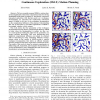Free Online Productivity Tools
i2Speak
i2Symbol
i2OCR
iTex2Img
iWeb2Print
iWeb2Shot
i2Type
iPdf2Split
iPdf2Merge
i2Bopomofo
i2Arabic
i2Style
i2Image
i2PDF
iLatex2Rtf
Sci2ools
ICRA
2008
IEEE
2008
IEEE
Impact of workspace decompositions on discrete search leading continuous exploration (DSLX) motion planning
Abstract— We have recently proposed DSLX, a motion planner that significantly reduces the computational time for solving challenging kinodynamic problems by interleaving continuous state-space exploration with discrete search on a workspace decomposition. An important but inadequately understood aspect of DSLX is the role of the workspace decomposition on the computational efficiency of the planner. Understanding this role is important for successful applications of DSLX to increasingly complex robotic systems. This work shows that the granularity of the workspace decomposition directly impacts computational efficiency: DSLX is faster when the decomposition is neither too fine- nor too coarse-grained. Finding the right level of granularity can require extensive fine-tuning. This work demonstrates that significant computational efficiency can instead be obtained with no fine-tuning by using conforming Delaunay triangulations, which in the context of DSLX provide a natural work...
Computational Efficiency | Continuous State-space Exploration | ICRA 2008 | Robotics | Workspace Decomposition |
| Added | 30 May 2010 |
| Updated | 30 May 2010 |
| Type | Conference |
| Year | 2008 |
| Where | ICRA |
| Authors | Erion Plaku, Lydia E. Kavraki, Moshe Y. Vardi |
Comments (0)

